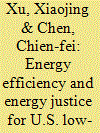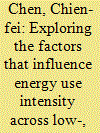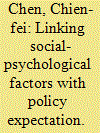|
|
|
Sort Order |
|
|
|
Items / Page
|
|
|
|
|
|
|
| Srl | Item |
| 1 |
ID:
166347


|
|
|
|
|
| Summary/Abstract |
Energy poverty intertwines with the issues of energy inequality and energy justice, presenting a particular challenge for low-income households (LIHs). This study explores energy justice in the U.S. through the lens of several interconnected questions: Do energy assistance programs have adequate participation rates? How accessible are energy efficiency (EE) appliances? Are there different energy practices across income groups? How does time schedule of energy practices differ across income groups, and how is it connected to energy demand flexibility? Based on two representative data sets, this study finds that affordability and accessibility remain serious problems for LIHs. LIHs have lower participation rates in many EE programs and own fewer EE appliances and smart grid technologies. Additionally, thermostat control strategies are different across income levels. LIHs tend to set one fixed temperature, even when they own a programmable thermostat, which is less energy efficient. LIHs engage in more energy practices throughout the daytime than their counterparts and show the least pronounced morning and evening peaks, indicating a relatively inflexible schedule and barriers to accepting demand response programs. This study concludes with policy implications for making energy more affordable, accessible, flexible, and better for the environment, while being fair to those often underserved.
|
|
|
|
|
|
|
|
|
|
|
|
|
|
|
|
| 2 |
ID:
186437


|
|
|
|
|
| Summary/Abstract |
This study examines the relationships between energy use intensity (EUI), which is considered to be an indicator of energy efficiency, and dwelling or housing characteristics, technology (appliances), socio-demographic characteristics, geographic factors, and energy-related behavioral actions. Additionally, it explores whether these relationships vary across low-, medium-, and high-income households. The study is based on regression analyses conducted on a representative sample of households, the 2015 U.S. Residential Energy Consumption Survey. Overall, the analysis revealed two important findings. First, residential energy use intensity is shaped significantly by housing characteristics, socio-demographic factors, technology, and energy-related behavioral actions. Second, the relationships between the factors examined and energy use intensity vary quite substantially across income groups. Lower income households have a higher EUI than higher income households. The policy implications of these findings are that reducing EUI in the residential sector, which may help with addressing energy burdens and poverty among low-income households, will require paying careful attention to these factors and their dynamic impacts across income groups.
|
|
|
|
|
|
|
|
|
|
|
|
|
|
|
|
| 3 |
ID:
177444


|
|
|
|
|
| Summary/Abstract |
The Chinese government has established a photovoltaics poverty alleviation (PVPA) program to help reduce rural poverty and environmental inequality. However, there is a scarcity of detailed investigations into how social-psychological factors influence the rural poor's decision to adopt solar photovoltaics. The present study examines the local voices of low-income villagers in the Wuhan region towards the PVPA projects from a social-psychological perspective. While focusing on local villagers' opinions before the onset of the COVID-19 pandemic, our findings suggest that villagers' neighbors have the greatest influence on those who subequently adopt solar PV. Similarly, village agents play a crucial role in spreading information and creating a sense of trust, which is different than other countries' solar adoption. The common goals of improving the local community aesthetically, environmentally, and economically also increased villagers' adoption likelihood. These improvements boosted villagers' sense of pride, which, in a virtuous cycle, further encouraged participation in improving the community. Residents' fears were reduced through local social interactions which increased knowledge, such as village-wide technology demonstrations, conversations with local adopters, and town hall discussions with village leaders. However, --- the PVPA projects and skepticism about when or if they would receive promised government subsidies prevented many from adopting. These findings provide valuable implications for policymakers in China and other developing countries who wish to encourage renewable energy adoption after the pandemic.
|
|
|
|
|
|
|
|
|
|
|
|
|
|
|
|
|
|
|
|
|